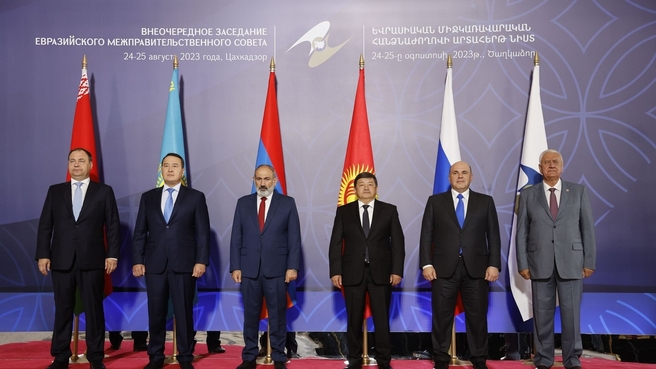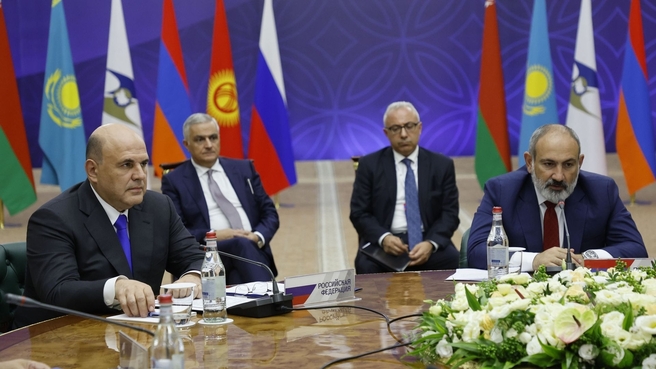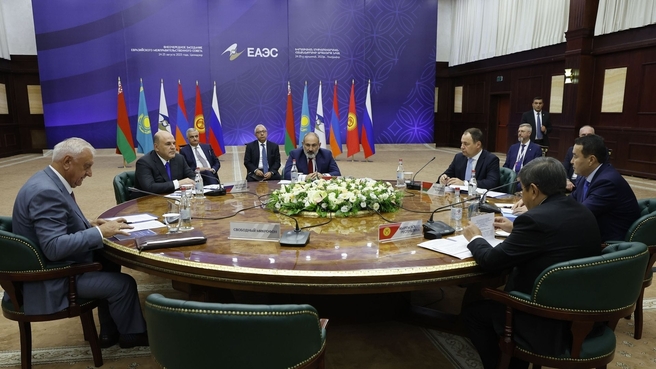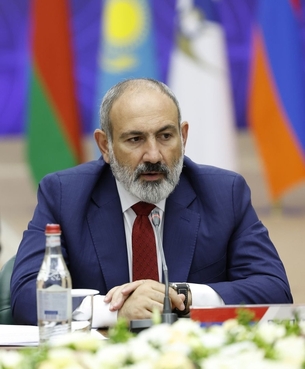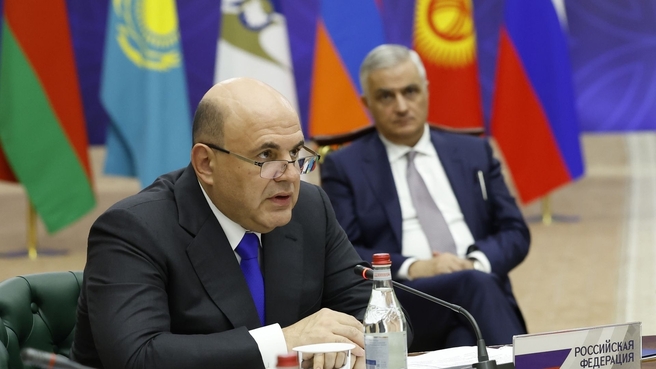The event was held under the auspices of the Russian chairmanship of the Eurasian Economic Union.
Heads of delegations taking part in the Eurasian Intergovernmental Council meeting:
Joint photo of the heads of delegations taking part in the Eurasian Intergovernmental Council meeting
Prime Minister of the Republic of Armenia Nikol Pashinyan;
Prime Minister of the Republic of Belarus Roman Golovchenko;
Prime Minister of the Republic of Kazakhstan Alikhan Smailov;
Prime Minister and Chief of Staff of the Presidential Executive Office of the Kyrgyz Republic, Chairman of the CIS Council of Heads of Government Akylbek Japarov;
Prime Minister of the Russian Federation and Chairman of the Eurasian Intergovernmental Council Mikhail Mishustin;
Chairman of the Eurasian Economic Commission Board Mikhail Myasnikovich.
Excerpts from the transcript:
Nikol Pashinyan: Today we have a meeting of the Eurasian Intergovernmental Council, and we should discuss the prospects for the Eurasian Economic Union.
I would like to emphasise that in general, despite all the challenges, the Eurasian Economic Union is developing well, despite the difficult international situation. And trade within the Eurasian Economic Union is growing at a stable pace. This is one of the few bright spots in our regional affairs.
Indeed, the economy is very important. And we are now focused on the implementation of the Strategy 2025, the strategy for developing the Eurasian Economic Union. We are currently working on a draft submitted by the Russian Federation, the St Petersburg Declaration. This is a very interesting project, and many of the postulates are generally acceptable. And I think that in general there is a positive atmosphere about the project, but there are also nuances that need to be further discussed.
What is the main issue? It is the following: there are some nuances with economic integration going forward, with the positions of the member countries differing slightly. But I think there is an opportunity to find concrete win-wins. All our colleagues are very positive.
Of course, there are many nuances regarding the further development of the Eurasian Economic Union. Of fundamental importance is the creation of a real common gas and energy market. And it is also very important to coordinate the credit and financial policies of our governments. We are working very closely on this, too.
Our main goal is to develop the economies of our countries and raise the level of well-being of our citizens. I think that in this area the Eurasian Economic Union states are really very interested in cooperation within the union. We can see some signals that indicate that other countries are also interested in further developing relations with the Eurasian Economic Union.
I now give the floor to Chairman of the Intergovernmental Council Mikhail Mishustin, and I once again want to welcome everyone to the Republic of Armenia.
Mr Mishustin, please, go ahead.
Mikhail Mishustin: Mr Pashinyan, colleagues, heads of the delegations.
I am delighted to welcome everyone at the Eurasian Intergovernmental Council meeting. I would like to thank our Armenian friends for their efforts – as always, the event is excellently organised. Allow me to convey to you all best wishes from President of Russia Vladimir Putin.
Next year the Eurasian Economic Union will mark its tenth anniversary. We see that regional integration is becoming an effective tool for development and makes it possible to ensure equal and fair participation in the global economic system.
Since the EAEU’s inception, mutual trade between our countries has grown by almost 90 percent. The group’s aggregate GDP grew by more than 7 percent. Investment in fixed capital is also on the rise. Construction has been showing good results, and positive trends are evident in the labour market. The number of unemployed persons decreased by almost 11 percent in June.
In his address to the heads of the five countries in January, President Vladimir Putin proposed discussing together the implementation of the Strategic Guidelines for the Development of Eurasian Integration and starting to prepare new long-term planning documents to outline interaction vectors for the future.
The Supreme Eurasian Economic Council will meet in St Petersburg in December. We believe that in addition to a performance report for the period under review, it is important for us to present our leaders with specific initiatives to bolster our cooperation. We propose including them in a Declaration on the Main Goals and Key Areas for the further development of integration processes within the EAEU and adopting this strategic document at a meeting of the Supreme Eurasian Economic Council where our leaders will gather at the end of this year.
It is necessary to lay a solid foundation for future joint actions now. The Eurasian Economic Union must become a self-sufficient macro-region and, at the same time, be appealing and open to other partners.
The priority objective is to continue the formation of common markets for goods, services, finance and investment, as well as labour to improve the quality of life and well-being of our citizens, and entrepreneurial activity.
It is necessary to create a common space in which key products and resources are guaranteed. First of all, this includes food and energy security.
This topic has become particularly important against the background of difficulties with grain supplies to the global market.
The union is the world’s third largest producer of wheat, potatoes and livestock products. Agricultural production has grown significantly. At the end of last year, growth stood almost at 9.5 percent. In the first half of this year, it approached 3 percent. The Big Five countries will remain reliable suppliers of agricultural goods to domestic and foreign markets.
We are fully self-sufficient in gas, oil, refined products and electric power as well. It is crucial to jointly expand geological exploration and infrastructure, which we need for stable and uninterrupted supply of these essential resources to individual and corporate customers.
Another critical and significant area is unlocking our technological and industrial potential. President Vladimir Putin has proposed joining efforts to develop and implement advanced scientific and technological solutions in the leading sectors of the economy, including the automotive industry, the chemical industry, transport and agricultural machinery, alternative energy, microelectronics, aircraft and shipbuilding, digital ecosystems, pharmaceuticals, biotechnology, and seed production. I could go on.
We have taken a number of serious steps to deepen industrial cooperation in order to produce goods with high added value. In particular, in the first six months of 2023, industrial production in the union grew by almost 3 percent compared to the same period last year. We can achieve major results and we expect that this will be facilitated by the imminent launch of supranational mechanisms for financing promising projects from the union budget.
A few words about the transport and logistics infrastructure.
As President of Russia Vladimir Putin noted, the development of seamless and safe international transport corridors between our five countries, the members of the union, is now acquiring special significance. This is a priority goal for the Russian Chairmanship.
We consider it necessary to closely coordinate our efforts on improving passenger and cargo traffic connections, introducing electronic shipping documents and promoting several new infrastructure projects.
Another important issue is the expansion of our interaction in finances and investment.
Today, most mutual transactions are taking place in national currencies and 80 percent of our countries’ banks are using the financial messaging system. We suggest using our national currencies to develop a common payment space and introduce a Eurasian rating system. In this way, we will improve the investment climate and, most importantly, enhance the security of our transactions and the sustainability of our economies.
The Eurasian Economic Union is one of the poles of the emerging multipolar world order and it remains open to new partners.
We are well aware that development of interaction with other states and other regional associations is very much needed today. This is also necessary for creating the Greater Eurasian Partnership as suggested by President of Russia Vladimir Putin.
This strategic initiative will make it possible to create a common economic space for equitable cooperation and a very broad integration platform, as well as a ramified network of trade agreements. This would help resolve major technological problems and adjust production chains. I would like to urge all of you to join this work more actively.
Esteemed colleagues and dear friends,
Human capital remains the most valuable resource in each of our states. It is very important to focus on the development of a comfortable environment for our people. This proceeds from the economy of knowledge. It is possible to achieve this by establishing common principles and standards in education, healthcare and state government and by implementing joint projects in science, culture, sports and tourism with a view to upgrading the level of integration cooperation.
In today’s conditions of complicated external factors and the unprecedented sanctions pressure from the collective West, our union is being tested for strength. However, it has already proven its value and relevance many times.
I am deeply convinced that together, the countries of the EAEU can find mutually acceptable solutions to the most difficult problems. After all, we can both listen to each other and come to terms for the benefit of our peoples.
